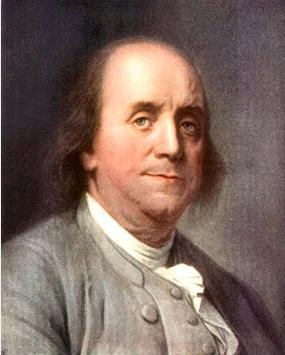
Today is the 300th anniversary of the birth of Benjamin Franklin. The tenth son of a Boston soap and candle maker, Franklin was apprenticed, at age 12, to his brother James' newspaper, the New England Courant, where he learned the printing trade. At seventeen, following a dispute with his brother, Franklin ran away and fled to Philadelphia. It was in Philadelphia where he rose to fame and dazzled the world with his wit, inventions, scientific discoveries and public service. The list of Franklin's accomplishments in the eighty-four years between his birth in 1706 and death in 1790 and is too huge to enumerate here.
Rather that list the details of Franklin's life or his numerous accomplishments, let's take a look at Franklin through the eyes of Franklin's fictional Poor Richard the namesake of Franklin's famous Poor Richard's Almanac. In the Almanac, which was written and published annually by Franklin from 1732 to 1757, Franklin dispenses numerous one and two line tips for better living. The almanacs contained other information, but are best remembered for these short one or two line bits of wisdom. Poor Richard's Almanac was an immediate success and made Franklin known throughout British North America.
Most, if not all, of these sayings were not original but copied from others going all the way back to the Book of Proverbs in the Old Testament. On the one hand they are common sense guidelines for good living that should be obvious and known by everyone. On the other hand, they are so basic and obvious that most people don't think about them which is why the majority of the human race, since the time of Adam and Eve, continues to make the same stupid choices and mistakes generation after generation.
Because of these sayings and Franklin's own long and successful life, he is often held up as an example of the wisdom of living by these guidelines. Franklin did probably try, and try is the operative word, to live by them. More than likely, Franklin used them as a daily reminder in his life-long struggle to do the right thing. Like the rest of us, Franklin's actions did not always live up to these ideals. There were periods in his life when he squandered his money, over indulged in food and drink and enjoyed the favors of other women (his eldest son, William was the product of a illicit union before his marriage). But struggled on and kept trying to follow these bits of wisdom and, looking at his life as a whole, we see that he succeeded more than he failed. So, armed with the knowledge that the advice from Franklin's Poor Richard is not only good but also helped Franklin in his struggle to do what was right, we will proceed.
Since it is the New Year and the number one resolution for most people these days is stick to a diet and lose weight we will take a look at Poor Richard's advice in this area first. You will note in these instructions, as in his instructions in other areas, Franklin stresses moderation rather than denial. Eating is for pleasure as well as nourishment but, done in excess, the pleasure is not only diminished but other problems result as well. The goal here is balance in daily activities.
To lengthen thy Life, lessen thy Meals.
A fat kitchen, a lean Will.
I saw few die of Hunger, of Eating 100000 .
Eat few Suppers, and you'll need few Medicines.
Excess in all other Things whatever, as well as in Meat and Drink, is also to be avoided.
Wouldst thou enjoy a long Life, a healthy Body, and a vigorous Mind, and be acquainted also with the wonderful Works of God? labour in the first place to bring thy Appetite into Subjection to Reason.
If thou art dull and heavy after Meat, it's a sign thou hast exceeded the due Measure; for Meat and Drink ought to refresh the Body, and make it cheerful, and not to dull and oppress it.
Money is the next category and one, A penny saved is a penny earned, that many associate with Franklin. Franklin followed many of these precepts and became wealthy. But he also went against the wisdom presented here at times in his life and lost (for example, on an early trip to London to gain further training in the printing trade he squandered his funds and was forced to return home broke). Here, Franklin is not only passing on the wisdom of the ages, but also has personally experienced both the benefits of following this advice (as evidenced by his success and fortune) and the consequences of ignoring it (as evidenced by some notable failures in his life). In an era where use of credit is widespread, savings small and people are stressed out by people trying to satisfy unlimited wants, it pays to pause and reflect on these sayings.
Buy what thou hast no need of and ere long thou shalt sell thy necessities.
If you know how to spend less than you get, you have the philosopher's stone.
If you would know the value of money, go and try to borrow some.
So much for industry, my friends, and attention to one's own business; but to these we must add frugality if we would make our industry more certainly successful. A man may, if he knows not how to save as he gets, keep his nose all his life to the grindstone, and die not worth a grout at last.
The use of money is all the advantage there is in having it.
There are three faithful friends - an old wife, an old dog, and ready money.
Time is money.
Wealth is not his that has it, but his that enjoys it.
Ne'er take a wife till thou hast a house (& a fire) to put her in. (In other words, don't get married until you can afford it. (NOTE: the (& a fire) refers to the ability to furnish the house with heat and light – and much more by today's standards. Franklin is obviously not suggesting that the wife be thrown into a fire).
He that buys by the penny, maintains not only himself, but other people.
Again, He that sells upon Credit, asks a Price for what he sells, equivalent to the Principal and Interest of his Money for the Time he is like to be kept out of it: therefore
- He that buys upon Credit, pays Interest for what he buys.
- And he that pays ready Money, might let that Money out to Use: so that
- He that possesses any Thing he has bought, pays Interest for the Use of it.
- Consider then, when you are tempted to buy any unnecessary Household stuff, or any superfluous thing, whether you will be willing to pay Interest , and Interest upon Interest for it as long as you live; and more if it grows worse by using.
Yet, in buying Goods, 'tis best to pay ready Money, because,
- He that sells upon Credit, expects to lose 5 per Cent by bad Debts; therefore he charges, on all he sells upon Credit, an Advance that shall make up that Deficiency.
- Those who pay for what they buy upon Credit, pay their Share of this Advance.
- He that pays ready Money, escapes or may escape that Charge.
If you would be wealthy think of saving as well as getting:
The Indies have not made Spain rich because her outgoes are
greater than her incomes. (Here Franklin is referring to the vast wealth of gold and silver the Spanish government received from the Aztec and Inca treasures. However, their spending increased by more than the huge inflow of gold and silver causing the government to be in deficit.)
You may think, perhaps, that a little tea, or a little punch
now and then, diet a little more costly, clothes a little
finer, and a little more entertainment now and then can be no
great matter but remember what Poor Richard says "Many a little
makes a mickle; beware of little expense for a small leak will
sink a great ship." (Note: mickle is an old English word meaning great or greatly)
A child and a fool imagine twenty shillings and twenty years can never be spent.
He that is of the opinion money will do everything may well be suspected of doing everything for money.
Money has never made man happy, nor will it, there is nothing in its nature to produce happiness. The more of it one has the more one wants.






1 comment:
Great page! I wanted to share this with you; I have just completed a New Portrait of Benjamin Franklin! It has been made into the New Town Seal of Franklin, MA. the first town named after Ben Franklin. You can check out the painting at my website and check out the town seal with the PressRoom link on my main page.
Post a Comment